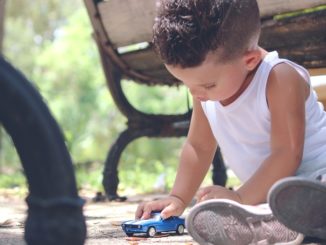
Every kid goes through that obsessive stage. We joke about little boys and dinosaurs, but really, it can be anything. My youngest son is fascinated with anatomy and by age 4 could tell you exactly where some pretty obscure organs are located. As a little girl, I knew everything there was to know about horses. The fact is, kids obsess . . . and it can get really annoying! The trick is to turn that obsession into a solid base of future knowledge.
See, when kids are obsessed with stuff, they learn about it. And in the process? They learn other skills, too. So, before you decide your child’s ridiculous brainful of tractor facts is useless, consider using these techniques to turn that obsession into something bigger and better.
1. Teach Them Counting Skills
Have a toddler who knows more about sharks than you do? Great! Have them count sharks with you. They’ll be very into it, because it’s their obsession and the fact that you’re into it too will just fuel their desire. You can take it a step further by incorporating writing.
To do this, take a picture of some of the items your child has and print them out in a row on a single sheet of paper, leaving plenty of space for writing. Use clear contact paper to cover the sheet and make it a dry erase page. Then let your kids count how many of each item they have . . . and practice writing it down.
2. Teach Colors
No matter what your kid is into, color is bound to come into it. For little ones, this is ideal for teaching colors. You’ll be interacting with them on a subject they love and you can turn that into an education on colors. Don’t stop with the basics, though. Go ahead and teach the more subtle names for colors too . . . your child will use them later in life and there’s pretty much nothing cuter than a toddler telling you something is fuschia instead of pink.
3. Teach Organization
Little kids can learn to sort and categorize their obsession. For example, if your little one has a huge collection of Hot Wheels, help them sort into colors or organize by size, etc. This is a great skill to have and it will help them in school later on.
Have older kids? No problem! They can learn to create inventories (hey, writing practice, too) by making lists of what they have and what they don’t have. Pokemon is a great example of this . . . kids can organize their cards and list out which cards they need still. They can also organize by Hit Points, Skills and more. The older the kid, the more complicated the system can be.
4. Teach Them to Look After Their Things
When your child loves something, they’ll be more likely to take care of it. This can be turned into a useful lesson going forward. If one of their toys is ruined or a book about something they love is destroyed because they didn’t take proper care of it, you can use this as a lesson.
Even before this happens, show your children the right way to look after their things. Remind them to put their toys away so nothing happens to them and to treat their books gently. It’s important to let them know what the possible consequences are.
5. Help Them Study
Learning to learn will help your child in the future, so work on those study skills with things they’re interested in. If your little one is obsessed with something, make sure to provide as much as you can to help them learn. Don’t just tell them the facts, encourage them to read library books, watch videos, etc. If your child can’t read yet, go ahead and read to them and ask them to recall the facts after.
Study skills don’t need to be too formal with this type of thing, but the very fact that you encourage your children to research will give them the ability and knowledge to do the same later on. Once they are in school, they’ll need to know where to find the necessary information for their classes and having an early start will put them far ahead of their peers.
It may not seem like much, but these little steps will help you see what your children are learning as they focus on their interests. Like adults, they learn best when they’re invested in the things they’re learning, so you’ll find that a child’s knowledge grows in leaps and bounds. It’s the perfect time to teach some valuable skills.
What are your children obsessed with?
Leave a Reply